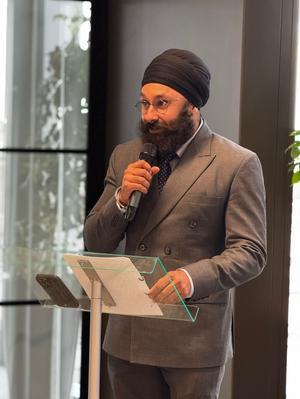
When the Midlands Asian Lawyers Association invited Baldip Singh to speak at their wellbeing event recently, he knew exactly what he wanted to talk about.
I wanted to talk about something that we rarely give enough attention to: ourselves. Our backgrounds, our lived experiences, and, crucially, how not to run ourselves into the ground while trying to succeed in this profession.
The Ethnic Minority Work Ethic. Many of us grew up hearing the same message from parents and grandparents: “We came here so you could have a better life. Work hard. Keep your head down. Never say no. Never complain.”
It is a noble ethos. It gave us resilience, focus and an unshakable drive. It probably kept many of us from quitting law school when we realised how many Latin phrases were lurking in the syllabus.
But that little voice we inherited, the one whispering “You’re not allowed to stop, you’ve got to work twice as hard, you must work harder than everyone else because youre already born at a disadvantage” has a cost.
We arrive early, leave late, and even help clean up at the end. We answer client emails at midnight “just to be helpful”. We turn “I’m on annual leave” into “I’m technically not in court but still on email.” We mistake exhaustion for commitment.
It’s admirable but it’s also dangerous. Because no client has ever said: “You know what I loved about my barrister? Their ability to work 90 hours a week until they fainted.”
Lived and Inherited Trauma
And then there’s trauma. Lived trauma and inherited trauma. It’s there, and it shapes us.
Some trauma we live directly:
- Being mistaken for the client, the interpreter, or my personal favourite being told: “Sorry, this room is for barristers only.”
- The subtle sense of being the “odd one out” around the table and having to prove, over and over again, that you belong.
- Being wheeled out whenever someone needs “the Asian perspective” on India, Pakistan or where to buy samosas as if culinary knowledge is your key contribution to legal policy discussions.
Some trauma we inherit: parents and grandparents who endured discrimination, worked three jobs, lived frugally, and said: “Don’t complain. Work harder.”
Even now, I feel guilty spending more than £90 on shoes. When your childhood shop cost £5 a week, three figures on footwear feels criminal.
That pressure makes us brilliant, yes, but also brittle. Failure feels unacceptable, so we push harder, take on more, and say “yes” when we mean “absolutely not”. Some of us even develop curious hobbies, like answering client emails while on holiday whilst pretending to enjoy ourselves at the same time.
But burnout is not glamorous. There’s no stirring soundtrack, no slow-clap moment of heroism. Just one day when you’ve had three coffees and still can’t remember why your phone is in the fridge.
Protecting Wellbeing
So, what do we do about it?
Set boundaries. Saying “no” doesn’t make you lazy, it makes you sensible. Clients respect lawyers who know their limits; it’s the perpetually frazzled ones they worry about. Charge a little more, take on a little less, and don’t be afraid to decline that “urgent” midnight call.
This profession worships people who are “always available”, but if you never switch off, your brain eventually will. Take holidays. Even if they’re short ones. Sleep properly. Take a lunch break away from your desk. Think of yourself as a high-performance car: you wouldn’t drive it flat-out with no service unless you fancy breaking down on the M40 en route to Bicester Village.
Find your people. A strong support network, mentors, friends, peers, is priceless. People who understand your world and can tell you, “No, the world won’t end if you don’t check your emails for 45 minutes,” before handing you a cup of tea.
Look after your health. Exercise, eat less processed foods, consider therapy – yes, therapy. Talking about stress is not weakness. Half of us are stressed, the other half are pretending not to be. Small, consistent changes – even just a lunchtime walk around the Inner Temple Gardens and some fresh fruit in chambers kitchen make a huge difference.
Redefine success. Being the best does not mean being the busiest. Success means doing your job well and still having the energy to eat dinner with your family, binge a box set, or simply enjoy being alive without mentally scrolling through your caseload.
The added lived and inherited experiences of many ethnic minority lawyers often fuel an extraordinary drive. We are determined, resourceful, and relentless, sometimes because we feel we must be. That commitment and resilience can be our superpower. But like all superpowers, it comes with responsibility, especially to ourselves and our families.
The law is a marathon, not a sprint, and running it exhausted doesn’t make you noble, it just makes you slower.
So take your breaks. Protect your time. Enjoy your tea while it’s still warm, at least once this week. And remember: you are your greatest professional asset.
Baldip Singh is an international family law barrister at No5 Chambers in London and the founder of Sikhs in Law. He was called to the Bar in 2013.